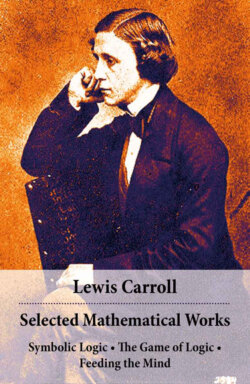Читать книгу Selected Mathematical Works: Symbolic Logic + The Game of Logic + Feeding the Mind: by Charles Lutwidge Dodgson, alias Lewis Carroll - Lewis Carroll - Страница 17
На сайте Литреса книга снята с продажи.
§ 3. Various kinds of Propositions.
ОглавлениеA Proposition, that begins with “Some”, is said to be ‘Particular.’ It is also called ‘a Proposition in I.’
[Note, that it is called ‘Particular,’ because it refers to a part only of the Subject.]
A Proposition, that begins with “No”, is said to be ‘Universal Negative.’ It is also called ‘a Proposition in E.’
A Proposition, that begins with “All”, is said to be ‘Universal Affirmative.’ It is also called ‘a Proposition in A.’
[Note, that they are called ‘Universal’, because they refer to the whole of the Subject.]
A Proposition, whose Subject is an Individual, is to be regarded as Universal.
[Let us take, as an example, the Proposition “John is not well”. This of course implies that there is an Individual, to whom the speaker refers when he mentions “John”, and whom the listener knows to be referred to. Hence the Class “men referred to by the speaker when he mentions ‘John’” is a one-Member Class, and the Proposition is equivalent to “All the men, who are referred to by the speaker when he mentions ‘John’, are not well.”]
Propositions are of two kinds, ‘Propositions of Existence’ and ‘Propositions of Relation.’
These shall be discussed separately.
